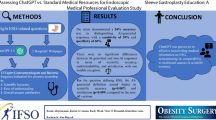Abstract
Objectives
To assess the ChatGPT (Open AI) artificial intelligence platform’s utility and accuracy as a patient education tool in robotic-assisted radical prostatectomy.
Materials and methods
The ChatGPT 3.5 interface (https://chat.openai.com/chat) was interrogated and asked the 14 questions related to the frequency of complications of robotic-assisted radical prostatectomy as listed on British Association of Urological Surgeons (BAUS) patient information leaflet "Robotic-Assisted Laparoscopic Radical Prostatectomy)" published July 2021. The AI's responses to each question were tabulated, and compared alongside the official figures quoted from the BAUS information leaflet. A global assessment of the AI’s response was also made for accuracy and relevance to patients.
Results
Of the 14 questions asked, 11/14 (78.6%) of ChatGPT’s quoted figures were considered concordant and comparable to those quoted by the BAUS patient information leaflet. 13/14 (92.9%) of ChatGPT’s responses were globally assessed to contain accurate information, appropriate, and pertinent to a patient’s potential enquiry.
Conclusion
ChatGPT is a powerful tool and is able to generate accurate and helpful information for patients seeking information regarding urological procedures and their potential complications. It is not, however, infallible, and urologists should remain vigilant in their patient interactions to any potential misinformation a patient may have gathered from it in their personal research prior to surgery.
Similar content being viewed by others
References
Brown T, Mann B, Ryder N, Subbiah M, Kaplan JD, Dhariwal P, et al. Language Models are Few-Shot Learners. In: Advances in Neural Information Processing Systems [Internet]. Curran Associates, Inc.; 2020. p. 1877–901. Available from: https://proceedings.neurips.cc/paper/2020/hash/1457c0d6bfcb4967418bfb8ac142f64a-Abstract.html. Accessed 16 Mar 2023
Gabrielson AT, Odisho AY, Canes D (2023) Harnessing generative artificial intelligence to improve efficiency among urologists: welcome ChatGPT. J Urol 209(5):827–829
ChatGPT General FAQ | OpenAI Help Center [Internet]. Available from: https://help.openai.com/en/articles/6783457-chatgpt-general-faq. Accessed 16 Mar 2023
Robotic-assisted radical prostatectomy (RARP) | The British Association of Urological Surgeons Limited [Internet]. Available from: https://www.baus.org.uk/patients/information_leaflets/180/roboticassisted_radical_prostatectomy_rarp. Accessed 16 Mar 2023
Mottet N, van den Bergh RCN, Briers E, Van den Broeck T, Cumberbatch MG, De Santis M et al (2021) EAU-EANM-ESTRO-ESUR-SIOG guidelines on prostate cancer-2020 update Part 1: screening, diagnosis, and local treatment with curative intent. Eur Urol 79(2):243–262
Hamdy FC, Donovan JL, Lane JA, Metcalfe C, Davis M, Turner EL et al (2023) Fifteen-year outcomes after monitoring, surgery, or radiotherapy for prostate cancer. N Engl J Med 388(17):1547–1558
Lantz A, Bock D, Akre O, Angenete E, Bjartell A, Carlsson S et al (2021) Functional and oncological outcomes after open versus robot-assisted laparoscopic radical prostatectomy for localised prostate cancer: 8-year follow-up. Eur Urol 80(5):650–660
Topol EJ (2019) High-performance medicine: the convergence of human and artificial intelligence. Nat Med 25(1):44–56
Hu K. ChatGPT sets record for fastest-growing user base - analyst note. Reuters [Internet]. 2023 Feb 2; Available from: https://www.reuters.com/technology/chatgpt-sets-record-fastest-growing-user-base-analyst-note-2023-02-01/. Accessed 4 Apr 2023
GPT-4 [Internet]. Available from: https://openai.com/research/gpt-4. Accessed 16 Mar 2023
Graham C, Reynard JM, Turney BW (2015) Consent information leaflets—readable or unreadable? J Clin Urol 8(3):177–182
Goodman RS, Patrinely JR, Osterman T, Wheless L, Johnson DB (2023) On the cusp: considering the impact of artificial intelligence language models in healthcare. Med N Y N 4(3):139–140
Schulz PJ, Nakamoto K (2013) Patient behavior and the benefits of artificial intelligence: the perils of ‘dangerous’ literacy and illusory patient empowerment. Patient Educ Couns 92(2):223–228
Author information
Authors and Affiliations
Contributions
JG designed and planned the manuscript, LS contributed to its writing, TL and AA had overall oversight and contributed to the results section.
Corresponding author
Ethics declarations
Conflict of interest
None.
Ethical approval
None indicated.
Additional information
Publisher's Note
Springer Nature remains neutral with regard to jurisdictional claims in published maps and institutional affiliations.
Rights and permissions
Springer Nature or its licensor (e.g. a society or other partner) holds exclusive rights to this article under a publishing agreement with the author(s) or other rightsholder(s); author self-archiving of the accepted manuscript version of this article is solely governed by the terms of such publishing agreement and applicable law.
About this article
Cite this article
Gabriel, J., Shafik, L., Alanbuki, A. et al. The utility of the ChatGPT artificial intelligence tool for patient education and enquiry in robotic radical prostatectomy. Int Urol Nephrol 55, 2717–2732 (2023). https://doi.org/10.1007/s11255-023-03729-4
Received:
Accepted:
Published:
Issue Date:
DOI: https://doi.org/10.1007/s11255-023-03729-4




